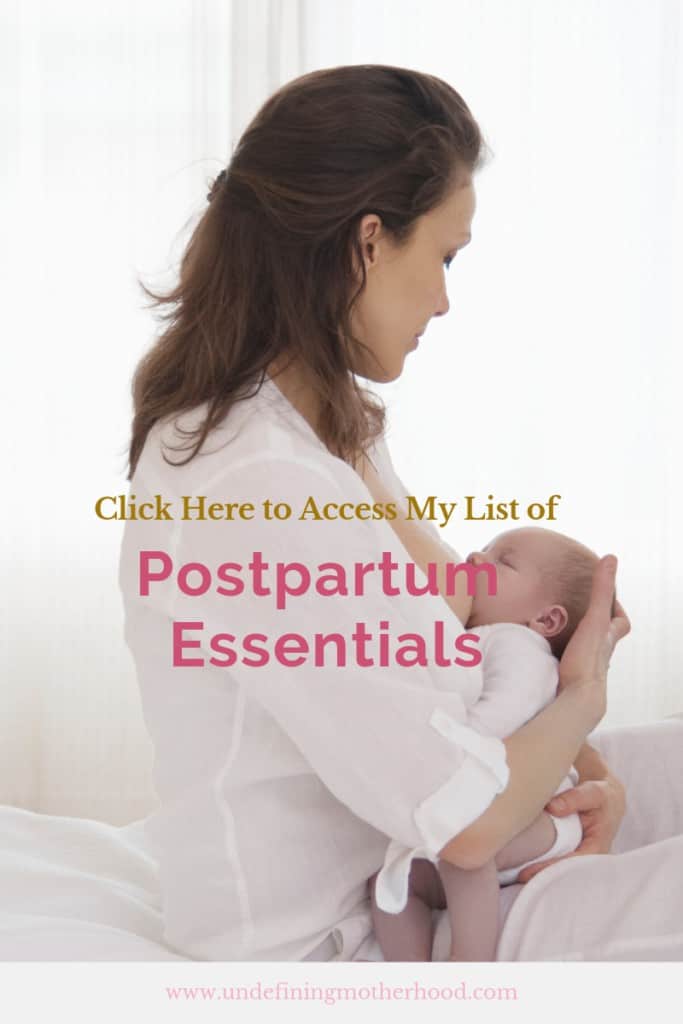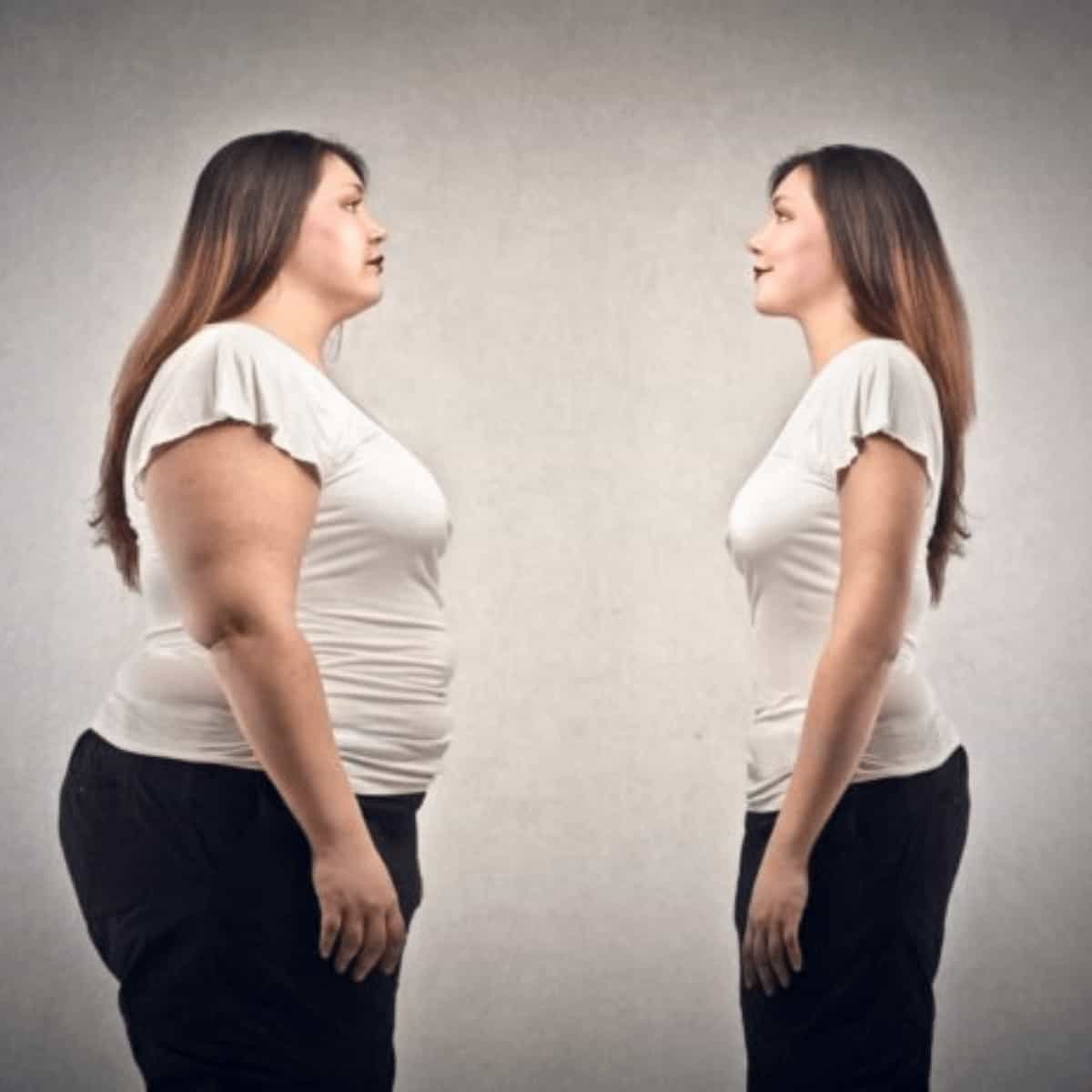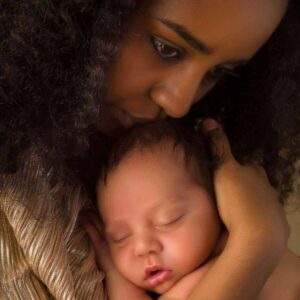Who among us has never wished for longer legs, a smaller waist, or a better-proportioned body? It never takes long, when in a group of mothers, before the discussion turns to our mama bodies. Very few mamas have a good postpartum body image.
We criticize our saggy boobs, the elephant skin flapping around our navel, and those last five pounds of milk fat stores on the thighs that have yet to believe we are finished sustaining another life.
In the 15+ years I have been a mother and the 10+ years I have worked in women’s fitness and health, the drumbeat of the postpartum body image song has been strong and steady.
“When will I get my body back?,” is the common refrain I hear regularly from my friends, my postnatal personal training clients, and my inner critic.

This site contains affiliate links, meaning that we earn a small commission for purchases made through our site. We only recommend products we personally use, love, or have thoroughly vetted.
Motherhood, Self-Identity, and the Postpartum Body
In the weeks after giving birth, many women experience a general disconnect with their postpartum body. This common feeling could last for weeks, months, or even years.
It results from the tremendous physical experience of gestating and birthing a baby. Your body may feel or look unfamiliar to you for a while. Living in that in-between state of no-longer-pregnant and not-back-to-normal is disconcerting.
Even if you did not birth your child, the transition into motherhood rocks your self-identity. Whether your motherhood badge was earned via adoption or a blended family, your inner idea of who you are changes.
Shifting identities of self are at the root of body image challenges for new moms.
Whether we’re uncomfortable with our stretch marks, c section scars, or weak pelvic floor muscles, it’s far easier for us to see our physical bodies than to have the clarity of mind to tap into what is happening emotionally.
As a result, the body becomes the target of our uncertainties, something many women think about many times a day, and an issue that’s often wrapped up in the baby blues.
Struggling with Postpartum Body Image?

Why are we so quick to judge, criticize, and self-flagellate? It is these same bodies that link us physically to our children.
Many of us gestated and breastfed our babies. But even if you did not birth your child or nurse her, your body has a central role in your mothering– hugging, holding, carrying, cuddling, chasing, tousling, and more.
These bodies of ours? They deserve to be honored and respected.
Whether that means simply flipping the script in your head to the positive or seeking out professional help to overcome your frustrations with the fact that you weren’t able to have a vaginal delivery, you and your body are worth it.
Self-Care Exercises
One of the self-care exercises I recommend regularly to the new mamas I work with is to make a body-love list. Once you start looking for what you love about your body, it really isn’t so hard to see it!
Although body-love list contains 26 items, ultimately, there are far more than 26 reasons to love your postpartum body!
Turning your attention to what your body has accomplished—and away from what it looks like—is a powerful shift.
When we believe our body is an amazing vessel that allows us to have deliciously human experiences, self-confidence follows, along with major and essential changes to our postpartum body image.
Please note: If you are experiencing feelings of self-hatred for any reason—including your postpartum body, I encourage you to seek support right away. Talk to your doctor (usually the healthcare provider who attended you during pregnancy and delivery.)
In most states, you’ll be screened for postpartum mental health problems at your 6 week postpartum checkup, but if you’re struggling earlier, lease take an online postpartum depression screening quiz and share the results with your physician.
Why Seeking Help is Important
It is so easy for new moms to neglect their own body’s needs because we focus so intently on our baby. This is human nature. We are biologically programmed to protect our young.
Even though it would be easy to say “baby needs a healthy mom” to justify taking care of yourself, I don’t believe that’s the whole story. You are still a person yourself, and you deserve to be healthy and whole to honor your own worth.
As Katy explains in her vulnerable discussion of her difficult postpartum experience, the postpartum body requires our love and attention. The healing process is hard.
From taking a stool softener to help with that first bowel movement, using a vaginal ice pack soaked in witch hazel to decrease pain from stitches, rinsing with warm water instead of toilet paper after peeing, mourning hair loss, or passing blood clots, your body requires tremendous self care after giving birth.
But the toll of negative postpartum body image extend far beyond those early weeks. Are you limiting your social or professional engagements because of your negative postpartum body image? Or are you unable to participate in activities you have always loved due to a lingering condition?
Seek Professionals Who Can Help
Either way, there are professionals who can use medically reviewed practices to help heal your body to get you back to the activities you enjoy.
Furthermore, it is often these very activities that nurture our self-identity. If you are living in a postpartum body that is limiting what you can do, you are experiencing a compounding of the identity crisis that affects many new moms.
Put simply, your quality of life suffers.
And if you are a woman who has never had challenges in her body before, you may feel extra stymied by this experience with poor postpartum body image.
This is not the time to doubt yourself or blame yourself for how your body responded to pregnancy and delivery. It’s simply an experience that is putting you more deeply in touch with your humanity.
Once we receive the support we need to make our body healthy from the inside out, we can return to the activities we love. Reconnecting with these activities validates our self-identity.
How to Build A Positive Body Image
When we can flip our mindset from wanting to “get our bodies back” to appreciating all they have done for us, we can build a new relationship with ourselves.
If we can embrace the mama body and be grateful to it for what it has contributed—an opportunity for us to nurture another human life!
There are common physical conditions postpartum women experience that may contribute to significant postpartum body image issues. But just because something is common does not mean it’s normal!
As someone who works with postpartum bodies, I assure you that most new moms are walking around with some sort of condition that is common but not normal. And whether these mamas realize it or not, there is almost always someone who could help them.
When these common issues are addressed, you can be back in your best body. And when your body is working well, it can be a source of strength and self-confidence.
Recognize Common Postpartum Body Challenges
(1) Diastasis Recti
Diastasis Recti (DR) is a condition where the six-pack abdominal muscle separates along the midline of the body. DR is extremely common in women who have been pregnant. The Mayo Clinic says about two-thirds of pregnant women develop a diastasis!

Most women with a DR want it to heal because the separated abdominal muscles often leave women with a small pooch belly, contributing to a poor postpartum body image. More importantly, however, an unhealed diastasis often leads to other issues like low back pain. DR also contributes to postpartum constipation. Healing diastasis recti is about much more than how you look in a bikini!
If you feel especially weak in the abdominals or low back, have you been checked for DR? Follow this link for tips on how to perform a DR self-assessment.
Know that some exercises can exacerbate DR, so make sure that, when you are ready to return to an exercise routine, you are practicing tummy-safe fitness.
(2) Sore Breasts
Sore Breasts limit some new moms, particularly if you are breastfeeding. To avoid this discomfort, you need to tune in to the rhythm between your baby and your milk supply.
You may have already experienced the serious discomfort that comes with trying to exercise when your breasts are full of milk. Timing your workouts to coincide with just after a feed may make exercise more comfortable. Wearing a supportive bra is essential.
While some women may revel in the novelty of having big, full breasts, others may find them nothing but a nuisance. Neither feeling is right or wrong. Just recognizing the normality of having new feelings about your mama body can feel validating.
(3) Stress Incontinence
Stress Incontinence is another common-but-not-normal condition many new moms experience. If you have ever peed on yourself (even just a tiny little bit!) when laughing, coughing, running, jumping, or when scared, you have stress incontinence.

Maybe you remember your healthcare provider telling you to do Kegels (or pelvic floor exercises), but you just never really got around to it. Or maybe you knew you were going to have a c-section, so you didn’t think it was that important. Regardless, learning how to do Kegel exercises appropriately is a good first step.
If Kegels don’t work, don’t think that you’re doomed to pee on yourself forever! Seeking help from a pelvic physical therapist is life-changing. These wonderful angels have dedicated their lives to helping women who are brave enough to admit they have a leaky pelvic floor. Go see one, and get back your ability to run, jump, and play! Rebuild your postpartum body image with professional help!
Don’t be the mom who sits on the sidelines just because she’s worried that she might leak. Your kids are going to want you out there living life with them. And you don’t want to miss out on that, do you?
(4) Prolapse
Prolapse occurs when an internal organ like the bladder, cervix, vagina, or uterus slides out of the body. Women who experience long pushing stages of delivery are at a higher risk for prolapse due to the longer time bearing down.
Prolapse is a serious medical condition. Do not think your body will just fix itself on its own. And certain exercises make prolapse much harder to fix!
Women who return to high-impact exercise like running or cross-fit too soon risk a prolapse. If you participate in these activities, be aware of any change in how you feel in your pelvic floor.
If you ever feel a heavy, dragging sensation or can see and organ at the opening of the vaginal canal, get yourself to your midwife or gynecologist immediately. They will refer you to a quality women’s health physical therapist who can help get your lady bits back where they should be.
Postpartum Body Image the Second (or Third or Fourth) Time Around
Just like no two babies are alike, no two postpartum experiences are alike. Your health and fitness during pregnancy was likely not the same from one baby to another. Your birthing experience is also unique each time.
Our pregnancy and birthing experience contribute directly to our postpartum body image.
Some women feel much more confident with each pregnancy and baby. Other women feel more distance from their self-identity the larger the family grows. There is nothing right or wrong about either experience.
It is important, however, to recognize that, just because you had no issues one time, that doesn’t mean it will happen again. The good news is the converse is also true—just because you had a less than optimal experience one time doesn’t mean it will always be that way.
Motherhood is a winding journey. Being mindful of our bodies and the work they help us do is a respectful form of self-care. And we’re worth it—each and every one of us.
Tell us more about your experience(s) with postpartum body image in the comments. Recognizing how other women feel can help us all reconnect with our own senses of self.

Other Postpartum Articles
- How to deal with postpartum anxiety
- Best postpartum pajamas
- Postpartum must-haves
- Best postpartum bathing suits
Other Posts for New Parents
- Cloth diapering tips
- How to increase breastmilk supply
- Oversupply of breastmilk symptoms and treatment
- Choosing a backpack style diaper bag










4 thoughts on “How to Overcome Postpartum Body Image Challenges”